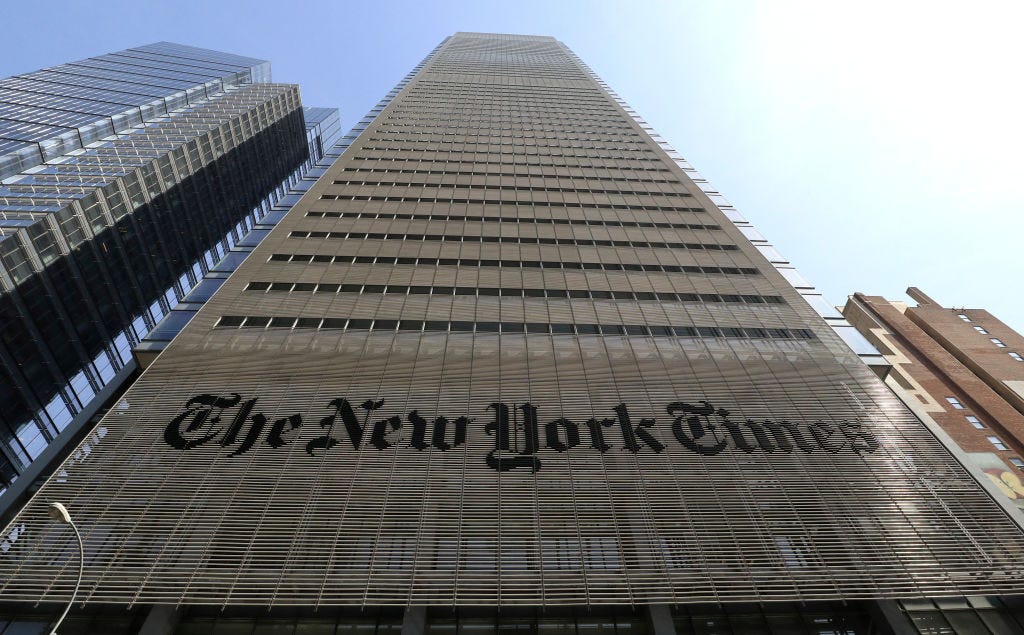The New York Times will soon have a new boss in the newsroom: a guy named Joseph Kahn, now serving as second-in-command to the current executive editor, Dean Baquet.
This may seem like inside media baseball but hear me out for a second, because the person in charge of the New York Times wields a tremendous amount of power in determining how the mainstream press responds to and covers the news of the day.
Baquet, for instance, is perhaps most famous for his decision to aggressively cover Hillary Clinton’s emails during the 2016 campaign, and to insist on a posture of aloof ‘objectivity’ in the face of the Trump-era GOP’s assault on American democracy.
Kahn will be setting the tone for how the paper covers the inevitable second Trump presidential campaign and whatever the fallout from that may be. Based on his previous statements Kahn seems likely to continue his predecessor’s aggressively even-handed coverage of an asymmetric political environment. In a 2017 speech, for instance, he denigrated readers who “want us to more forcefully confront a president they see as a threat to democracy and American power… Some media companies see it as in their journalistic or business interest to more formally take sides in this struggle. We have decided it is not in our journalistic or business interest to do that.”
This all augurs poorly enough for the paper’s political coverage in the coming years. But I want to focus on something else that hasn’t received as much attention, and which may have just as much of an impact on how the Times sets its agenda: Kahn grew up in an environment of staggering wealth, and almost certainly has a net worth running into the tens or even hundreds of millions of dollars himself.
Kahn’s father was Leo Kahn, a grocery store magnate who in 1984 sold the Purity Supreme chain for a sum of $80 million, when Joseph would have been 20. At the time the company was doing about $800 million in sales per year. Leo turned around and plowed some of that money into his most famous venture: he was one of the founders of office supply giant Staples, which at the time of his death in 2011 was pulling in $27 billion in sales annually.
It’s not clear how large Leo’s personal fortune was at the time of his death, or how much of it he passed on to his son Joseph. But it’s quite apparent that Joseph Kahn grew up in an environment of extreme wealth, and barring some incredibly unusual circumstances he almost certainly inherited tens of millions of dollars, if not more, at the time of his father’s passing.
Kahn’s “fabulous” wealth is evidently a topic of gossip within the Times, according to a recent insidery profile of the man by Shawn McCreesh, a well-connected writer who was formerly assistant to columnist Maureen Dowd. He owns an “opulent” property in upstate New York, hangs out with billionaires, and is an investor in trendy New York restaurants, according to McCreesh. When asked if he was the first top editor with more money than the Sulzberger family which owns the paper, Kahn batted the suggestion away but didn’t deny it.
Plutocratic involvement in the news industry is nothing new — Amazon billionaire Jeff Bezos owns the Post, for instance. But these days it’s unusual to have a member of that class actually running the newsroom, particularly in a print context. Kahn’s predecessor Dean Baquet, for instance, grew up in a working-class neighborhood in New Orleans and never graduated college. Former Post editor Marty Baron’s parents immigrated to the U.S. from Israel. LA Times executive editor Kevin Merida is the son of federal government employees.
His extreme wealth makes Kahn a conspicuous choice for a time when staggering wealth inequality is one of the greatest challenges facing the country. I asked a representative from the Times if Kahn cared to disclose exactly how much he was worth, or if he had any reflections on whether his family money contributed to any particular insights or blind spots about the world, and how that might inform his tenure as executive editor. The representative politely declined to answer any of those questions.
That’s fine — the paper’s certainly under no obligation to explain itself to me. But those are the sorts of questions with answers that would help readers evaluate the job Kahn’s doing and understand the direction the newsroom’s coming from in the next several years.
In general, I think it helps to harbor a good deal of skepticism toward anyone who’s independently wealthy but chooses to continue to try to influence world affairs in a significant way, whether that’s running for higher office or running a newsroom. Kahn may simply love what he does, and he’s certainly had the type of storied journalistic career you’d expect from a newsroom leader. But why even bother with that type of career when you’ve got millions of dollars to burn and billionaires to rub elbows with? And how, exactly, does that kind of fortune shape a person’s view of the world, and what stories they choose to tell, and how they choose to tell them?
These are all questions I’d really like answers to but the Times, at this point at least, isn’t talking.




